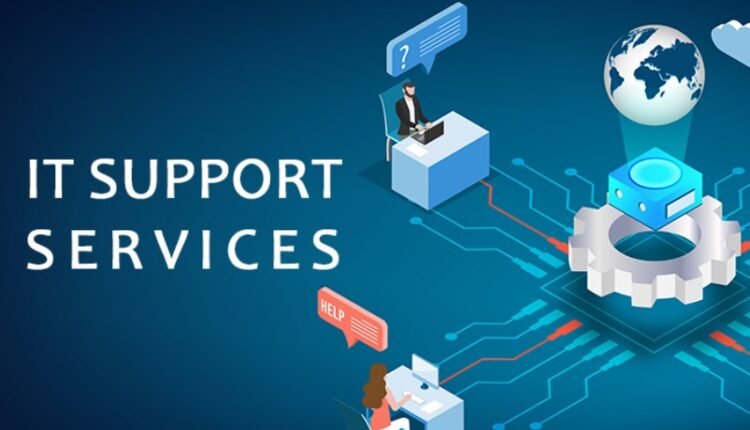In today’s digital age, businesses rely heavily on technology to streamline operations, enhance productivity, and stay competitive in the market. However, managing IT infrastructure efficiently can be challenging, especially for small and medium-sized enterprises (SMEs) with limited resources and expertise. This is where online IT services come into play, offering a wide range of solutions to address various IT needs remotely. From cloud computing and cybersecurity to software development and technical support, online IT services have revolutionized the way businesses manage their technology requirements. This article explores the significance of online IT services, their benefits, challenges, and the future of IT support in the digital era.
The Rise of Online IT Services:
Online IT services have gained significant traction in recent years, driven by advancements in technology, increased internet connectivity, and the growing demand for cost-effective IT solutions. Unlike traditional IT support models that require physical presence or on-premises infrastructure, online IT services leverage the power of the internet to deliver scalable and flexible solutions to businesses of all sizes. Whether it’s troubleshooting network issues, deploying software updates, or providing remote assistance, online IT services offer unparalleled convenience and accessibility.
Key Benefits of Online IT Services:
- Cost-Efficiency: One of the primary advantages of online IT services is cost-efficiency. By outsourcing IT tasks to remote service providers, businesses can significantly reduce infrastructure costs, overhead expenses, and the need for dedicated IT staff. This pay-as-you-go model allows organizations to scale their IT operations according to their specific requirements without investing in expensive hardware or software licenses.
- Accessibility and Flexibility: Online IT services provide round-the-clock support, allowing businesses to access technical assistance whenever needed, regardless of time zones or geographical locations. Whether it’s a sudden software glitch or a critical network issue, remote IT experts can troubleshoot problems remotely, minimizing downtime and maximizing productivity. Moreover, the flexibility of online IT services enables businesses to adapt quickly to changing technology trends and scale their operations seamlessly.
- Expertise and Specialization: Online IT service providers often employ highly skilled professionals with expertise in various domains, including cybersecurity, cloud computing, data analytics, and more. By partnering with specialized IT vendors, businesses can access a diverse pool of talent and resources that may not be available in-house. This expertise allows organizations to implement best practices, mitigate security risks, and optimize IT infrastructure for maximum performance and reliability.
- Scalability and Innovation: As businesses grow and evolve, their IT requirements also evolve accordingly. Online IT services offer scalable solutions that can adapt to changing business needs and technological advancements. Whether it’s expanding storage capacity, upgrading software applications, or integrating new technologies, online IT service providers can support businesses throughout their growth journey. Furthermore, online IT services often leverage cutting-edge technologies and innovative solutions to drive efficiency, enhance security, and improve overall business performance.
Challenges and Considerations:
While online IT services offer numerous benefits, there are also challenges and considerations that businesses need to address:
- Security Concerns: Entrusting sensitive data and critical infrastructure to third-party service providers can raise security concerns, especially regarding data privacy, compliance regulations, and cybersecurity risks. Businesses must carefully vet online IT service providers and implement robust security measures to safeguard their assets and mitigate potential threats.
- Reliability and Response Time: Dependence on remote IT support means businesses rely heavily on the responsiveness and reliability of service providers. Delays or downtime in resolving technical issues can impact business operations and customer satisfaction. Therefore, businesses should establish service level agreements (SLAs) and performance metrics to ensure timely and efficient support from online IT service providers.
- Integration and Compatibility: Integrating online IT services with existing infrastructure and software applications can be complex, requiring careful planning and coordination. Businesses must assess compatibility issues, data migration challenges, and potential disruptions before implementing online IT solutions. Seamless integration is essential to ensure interoperability, minimize disruptions, and maximize the value of IT investments.
- Vendor Lock-In: Depending too heavily on a single online IT service provider can lead to vendor lock-in, limiting flexibility and increasing dependency on a specific vendor’s ecosystem. To mitigate this risk, businesses should adopt a multi-vendor strategy, diversify their IT service providers, and maintain open communication channels to facilitate vendor transitions if necessary.
The Future of Online IT Services:
Looking ahead, the future of online IT services appears promising, driven by emerging technologies such as artificial intelligence (AI), machine learning (ML), and the Internet of Things (IoT). These technologies enable automation, predictive analytics, and proactive monitoring, revolutionizing the way IT support is delivered and managed. Additionally, advancements in cloud computing, edge computing, and 5G networks will further enhance the scalability, reliability, and performance of online IT services, enabling businesses to leverage the full potential of digital transformation.
Furthermore, the COVID-19 pandemic has accelerated the adoption of remote work and digital solutions, highlighting the importance of online IT services in enabling business continuity and resilience. As remote and hybrid work models become the new norm, online IT services will play a critical role in supporting distributed teams, securing remote endpoints, and optimizing virtual collaboration platforms.
Conclusion:
In conclusion, online IT services have emerged as a game-changer for businesses seeking cost-effective, scalable, and efficient IT solutions. From remote technical support and cloud migration to cybersecurity and software development, online IT services offer a wide range of benefits that empower businesses to stay competitive in today’s digital landscape. However, businesses must carefully evaluate the risks, challenges, and considerations associated with online IT services and adopt a strategic approach to maximize the value of their IT investments. By harnessing the power of online IT services and embracing technological innovation, businesses can unlock new opportunities, drive growth, and achieve sustainable success in the digital era.


Comments are closed.